UTAH WOMEN’S HISTORY / Explore the History / Walking Tour
Walking Tour
Learn about the downtown Salt Lake City sites involved in the Utah suffrage movement. This 3-mile loop begins at City Hall (Council Hall) and ends at the Utah State Capitol. We recommend allocating 2-3 hours. Please note that this walking tour involves elevation.
1 & 3 Council Hall
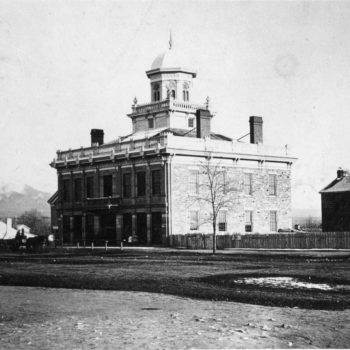
Photo courtesy of Utah State Historical Society
Completed in 1866 | Moved to this location in 1961
Here, the Utah Territorial Legislature voted unanimously to extend voting rights to women. This act became law on February 12,1870, when it was signed by the acting territorial governor. This made Utah the second territory to grant women’s suffrage, after Wyoming. Two days later, school teacher Seraph Young and 24 other women cast their ballots in a municipal election in this same building. Since Wyoming did not hold an election until September 1870, these 25 women were the first women to vote in the modern nation.
2 Social Hall

Photo courtesy of Utah State Historical Society
Completed in 1852 | Demolished in 1922
The Social Hall served as a community building for plays, dances, and suffrage meetings. Sarah M. Kimball,was elected president of the Utah Woman Suffrage Association here in 1890. In the 1990s, a glass frame was built around the building’s stone foundation. The glass frame houses the Social Hall Heritage Museum (downstairs) and is the same shape and size of the original Social Hall.
4 Site of Emmeline Wells' Home

Photo courtesy of LDS Church History Library
Lived here from 1856-88
Leading Utah suffragist and LDS Relief Society General President Emmeline B. Wells lived in a home here while she was the editor of the Woman’s Exponent and organized and participated in many territorial and national suffrage events. She also oversaw the Relief Society’s grain-saving project, eventually selling 200,000 bushels of wheat to the U.S. government during World War I.
5 City and County Building
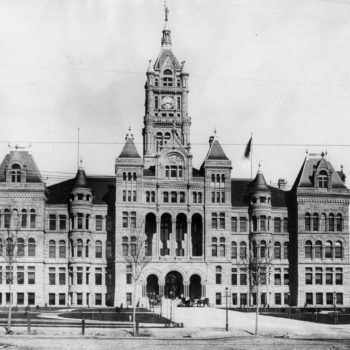
Photo courtesy of Utah State Historical Society
Completed in 1894
Utah held its 1895 State Constitutional Convention in this building. Women lobbied and convinced the all-male delegates to include in the new constitution a clause guaranteeing women’s right to vote and hold public office. Utah voters overwhelmingly approved the constitution, Congress ratified it, and President Cleveland signed it on January 4, 1896, making Utah the third state to grant women suffrage. That year, Martha Hughes Cannon ran for state senate and became the first female U.S. state senator.
6 Salt Lake Theater

Photo courtesy of Utah State Historical Society
Completed in 1862 | Demolished in 1928
In March of 1886, Mary Isabella Horne organized a meeting of 2,000 people to hear her and other suffragists speak against the impending Edmunds-Tucker anti-polygamy bill, which would rescind Utah women’s voting rights. Despite mass protest, the bill passed in 1887. In September 1888, national suffrage leaders Clara Bewick Colby and Elizabeth Lyle Saxon spoke here before large audiences. This legitimized Utah’s relationship with the national movement and provided impetus for the formation of the Utah Woman Suffrage Association.
7 Council House
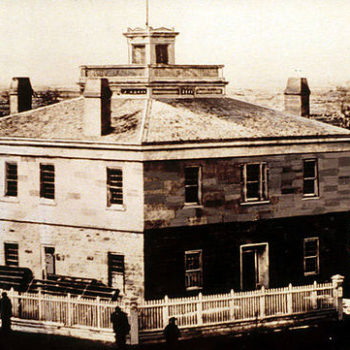
Photo courtesy of Utah State Historical Society
Built in 1850 | Destroyed by fire in 1883
The Council House (or State House) was the first public building in Utah. For a time, it housed the offices of the Woman’s Exponent, a women-produced newspaper that ran for 40 years and voiced strong support of women’s suffrage. Meetings with local and national suffrage leaders were held here, where Emmeline B. Wells was the primary editor and Martha Hughes Cannon worked as a typesetter to earn money for medical school.
8 Old Salt Lake Tabernacle
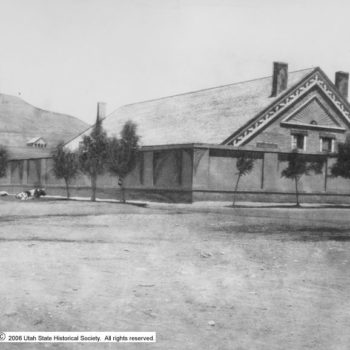
Photo courtesy of Utah State Historical Society
Completed 1857; demolished in 1877 —On January 13, 1870, more than 5,000 LDS women gathered in a “Great Indignation Meeting” here to protest federal anti-polygamy legislation, marking their entry into public life and demonstrating a willingness to defend their beliefs. This was a major catalyst for the February 1870 Woman Suffrage Bill. Soon after, Elizabeth Cady Stanton and Susan B. Anthony, the president and vice president of the National Woman Suffrage Association held a five-hour meeting with 300 women here to celebrate Utah’s progress for women.
9 Assembly Hall

Photo courtesy of Utah State Historical Society
Completed 1882
On January 10, 1889, Emily S. Richards and Margaret Caine organized a women’s meeting here to create the Utah Woman Suffrage Association, a local branch of Susan B. Anthony’s National Woman Suffrage Association.
10 Salt Lake Tabernacle

Photo courtesy of Utah State Historical Society
Completed in 1867
Susan B. Anthony attended a dedicatory ceremony of the new (and current) Tabernacle. This visit marked the beginning of a warm relationship between Anthony and Utah suffragists like Emmeline B. Wells. In May 1895, Anthony and the Reverend Anna Howard Shaw spoke in the Tabernacle as part of the Rocky Mountain Woman Suffrage Convention.
11 Hotel Utah

Photo courtesy of Utah State Historical Society
Operated as hotel from 1911–1987
In 1915, Utah suffragists and leaders of the Congressional Union for Woman Suffrage paraded in automobiles up Main Street to the Hotel Utah, where they met with Utah Senator Reed Smoot. This event was one of many held as part of suffragist Alice Paul’s Western States tour to promote the national women’s suffrage amendment. From 1916-21, Emmeline Wells lived in room 834. U.S. President and Mrs. Woodrow Wilson visited her here to thank her for her advocacy and WWI relief efforts
12 McCune Mansion

Photo courtesy of Utah State Historical Society
Completed in 1900
The McCune Mansion, on the National Register of Historic Places, was built for Alfred and Elizabeth McCune. Like her close friend and leading Utah suffragist Susa Young Gates, Elizabeth actively supported women’s rights. After Utah achieved suffrage, she focused on national and international efforts, hosting many significant gatherings in her home. She attended the 1889 International Congress of Women in London, where she was voted patron of the organization and entertained by Queen Victoria at Windsor Castle.
13 Utah State Capitol
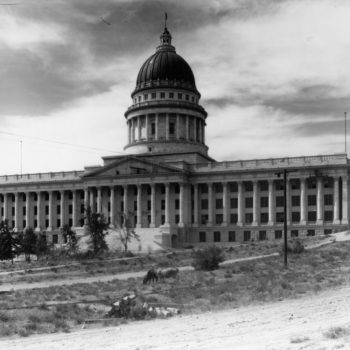
Photo courtesy of Utah State Historical Society
Completed in 1916
A ceremony celebrating the ratification of the 19th Amendment was held on the Capitol steps on August 30, 1920. It houses the offices of Governor Olene Walker, Utah’s first female governor and lieutenant governor; and the offices and courtroom of Chief Justice Christine Durham, Utah’s first female supreme court judge and chief justice. It is also home to memorials to Utah’s suffragists: a bronze statue of Martha Hughes Cannon (first female state senator), a bust of Emmeline B. Wells (Utah’s leading suffragist), and a mural of Utah women voting in 1870. Capitol docents can direct visitors to these memorials.


